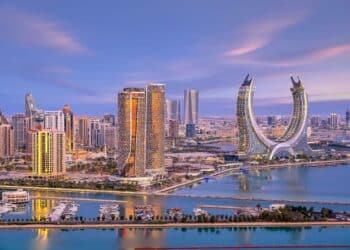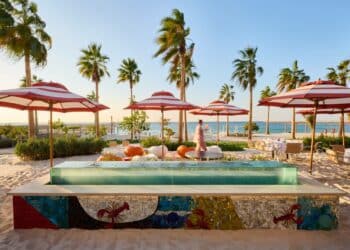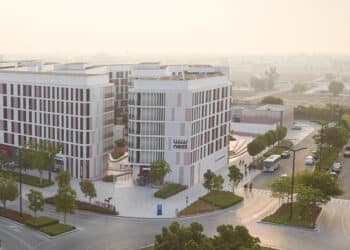
Since introducing a new tourist visa on September 28, the focus when it comes to Saudi Arabia has been on what it means for travellers and residents alike. Hospitality and F&B leaders are sparing no efforts in exploring the opportunities that the Kingdom now has to offer, and we find out from them what they look forward to the most.
Data released by Expedia Group has revealed that Saudi Arabia will see continued growth in the hotel sector across the Kingdom, fuelled by increasing demand from tourists.
The travel technology company’s research has shown that travellers from the USA, UAE and UK have topped the list for travel demand to KSA in 2018.
With travel bookings in the Kingdom considered the biggest in the Middle East and North Africa (MENA), the power of international traveller growth to Saudi Arabia is expected to remain strong.
“Major hotel groups are driving construction trends across the country as they aim to meet the demands of an ever-increasing number of domestic tourists and international visitors,” says Paula de Keijzer, senior director of market management for Africa, the Indian Ocean, Middle East and Turkey at Expedia Group.
“When it comes to brand affinity and customer loyalty, it’s essential to engage at each level of the customer journey. Tools, data and insights available via OTA extranet sites, like Expedia PartnerCentral (EPC), offer hoteliers the opportunity to inspire and convert travellers, set expectations, create personalised experiences, and identify and address issues to better meet guest needs, improve guest experience and drive repeat bookings,” she adds.
USA saw more than 110% year-on-year growth in demand compared to the same period in 2017 with almost 45% share of total room nights, the UAE saw a whopping year-on-year growth of above 140% than last year with almost 20% share of total room nights, while the UK had more than a 10% share of room nights with a year-on-year growth of above 40%.
According to data from Arabian Travel Market’s research partner Colliers, international arrivals to Saudi Arabia are expected to increase 5.6% per year from 17.7 million in 2018 to 23.3 million in 2023. Religious tourism is expected to remain the bedrock of the sector over the next decade.
Sunset Hospitality Group

CEO
Tell us about Sunset Hospitality’s biggest upcoming projects in the Kingdom.
Our vision is to increase Sunset Hospitality Group’s presence in the international scene. In the Middle East region, one of our key priorities is the Kingdom of Saudi Arabia. We expect Saudi to account for the biggest percentage of contribution to our business within the Middle East. We’re bringing the famous Black Tap brand into the KSA, opening in Jeddah and Riyadh.
We’re also looking at opening beach clubs in the Red Sea next to Jeddah and probably combining the beach experience within a boutique resort. We also plan on introducing Mood, our rooftop lounge, which combines lifestyle and dining.
What aspect of the Saudi market, or what segment, is of interest to Sunset Hospitality the most?
With 29 million residents and an annual population growth rate of 3.3 percent, Saudi Arabia has the largest population in the GCC. The Kingdom boasts one of the world’s youngest populations, with 70 percent of the country’s citizens under the age of 30.
Especially receptive to the newest technology and lifestyle trends, youth are often viewed as the most flexible when it comes to change, and this is particularly true of the evolving F&B sector.
What sets the Saudi market apart from others in the GCC and beyond? The Kingdom is evolving very quickly, and it has the potential to redefine the food and beverage industry because of the government’s commitment to enhancing the quality of life of its citizens, which will be instrumental in growing this sector.
Recently, there have been changes in legislations including rules which enabled women to drive and brought back cinemas. Eating habits have also changed; the removal of family sections previously enforced in restaurants and outlets resulted in more people going out, so it basically changes the social/dining dynamics in the country. This creates more opportunities, and different dining options with a stronger lifestyle component.
Kerten Hospitality

CEO
Tell us about Kerten’s biggest projects in the Kingdom at the moment. What’s in the pipeline?
KSA has been the launchpad for Kerten Hospitality in the Middle East, and with an investment license, we’re dedicated to bringing our unique mixed-use approach to the market through concepts that combine innovative spaces for working, living and socialising to create lifestyle destinations.
Our first project – Ouspace Madinah Road – opened in Jeddah earlier this year and is a modern workspace and business club offering tailor-made office spaces for short and long-term let, enabling entrepreneurs and businesses to work flexibly and collaboratively.
Our second Ouspace in Saudi Arabia, part of our first mixed-use project in the Kingdom, perfectly showcases this approach. Part of the upcoming 114-key The House Hotel Jeddah – also operated by Kerten Hospitality – we have replaced the classical meeting floor with a level dedicated to a mix of business and leisure (‘bleisure’).
Part of the Design Hotels collection, The House Hotel is a luxury hospitality concept with a reputation for quality and individuality. The House Hotel Jeddah will be the focal point of the prestigious City Yard development in the upmarket Al Rawdah district, a lifestyle destination that will showcase our expertise in creating innovative mixed-use spaces.
Accentuating our commitment to the Kingdom, we have recently welcomed Mishary Alhajery as Country Director for KSA. He will be spearheading our ambitious plans for expansion through our growing portfolio of brands, which also includes the mid-market lifestyle concept Cloud7, designed for the next-generation guest who appreciates a seamless travel experience and seeks inspiration from the locality and culture.
What were some of the most important initiatives in the fields of tourism, hospitality and F&B – and how have they helped you penetrate the market? Why mixed-use properties, and what makes them suitable for the Saudi market?
As work and lifestyle cultures drastically evolve, the lines between living, working and travelling have blurred. This has resulted in a shift in what guests are looking for from a hotel experience, with increasing demand for developments that meet the needs of the local community as well as visitors.
Kerten Hospitality has applied its hospitality know-how to identify an addressable niche in the Kingdom and help create destinations which meet demand for more engaging environments. The resulting environment is stylish and stimulating, with different spaces integrated with curated amenities to enable guests to create, network or retreat.
How different is the Saudi market from that of other countries in the GCC and beyond?
As the largest economy in the Middle East and North Africa, and with GDP forecasted to grow by 2% this year, Saudi Arabia is an increasingly attractive base for multinationals, small businesses and start-ups seeking to do business in the region.
Since the announcement of Saudi Arabia’s Vision 2030, progressive reforms are significantly encouraging tourism, such as through the latest visa announcement. This provides significant opportunities for operators and owners to introduce innovative hospitality concepts to this dynamic market.
How has the response been so far in Saudi?
The response so far has been fantastic. Ouspace Madinah Road has fast become a community hub, bringing people together through a variety of events and experiences that tap into their social and business needs, from laughter yoga through to tech talks with industry leaders.
From a management perspective, we’re excited to be collaborating with knowledgeable hotel owners who align with our objectives in order to deliver value to the whole ecosystem. They see what we’ve achieved, want to be part of this revolution and choose to work with an operator who has created a flexible business model.
Glee Hospitality Solutions

Managing Director
Tell us a bit more about your expansion plans in Saudi.
Glee Hospitality has been working on expanding our network into the Saudi market for almost a year now. To date, we’ve attained our license and committed an experienced member of our team to relocate to Riyadh in November to directly oversee day-to-day operations. We’re currently working on several projects in Riyadh and Jeddah and aim to launch additional projects in Madina and Khobar in the near future.
Our Saudi ventures will see us offer our time-tested services of concept development, complete with full turnkey solutions. We currently have an Arabic street food concept, Greek restaurant, an all-day diner and a burger outlet in the works.
We have two outlets set to launch this year in the Riyadh market, namely Black Spoon and Ole. These projects will be managed on the ground by our Saudi team with additional back office support provided from our Dubai branch until we reach critical mass in relation to accounting and HR.
What challenges have you faced and how did you overcome them?
The decision to expand into the market came with many factors to consider internally and we had to weigh each one carefully before proceeding. It took us a while to decide on whether it was more advantageous to proceed independently or with a partnership model, but in the end we were fortunate to have been able to open as a Saudi branch of Glee Hospitality Solutions under the new regulations of the SAGIA (Saudi Arabia General Investment Authority).
In terms of challenges, recruitment has been the biggest obstacle thus far, due to certain restrictions in place. To aid in overcoming this, we’re working with providers. Additionally, with regards to recruitment, attracting talented head chefs and managers has still proven to remain to be quite tricky.
What’s the most unique aspect of the F&B scene in Saudi Arabia?
In light of recent events, the KSA market has gone through significant cultural changes, and this has had a direct effect on the F&B market. The Saudi people are finally going out to experience the F&B scene with less restrictions. The market ‘’wants to go out’’ and enjoy the dining experience in contrast to other markets which heavily rely on the food delivery model.
Currently, there are a lot of offerings/options on the lower end of the F&B spectrum, whereas the middle high- to high-end still possess gaps with massive potential to be explored.
How do you see the build-up of the scene in Saudi and what initiatives are you feeling most positive about?
The Saudi F&B market is ripe for expansion when you consider that we’re dealing with a population that’s primarily under the age of thirty, and whom are hungry to explore. Moreover, the Saudi government is investing heavily in the travel and tourism industry with plans to build new hotels and resorts to foster this expansion.
We envision ourselves participating directly in this build-up and using our industry expertise to help cultivate this vision for the future.


































































